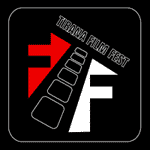Ron Holloway, GEP/Interfilm, 18 January 2004
“Welcome to the Tirana Short Film Festival” runs a patch on the festival’s website, and click - you’re in the domain of one of the most sophisticated festival launches on the net today, one that easily puts other festival websites to shame. Organized by filmmakers Agron Domi and Ilir Butka under the auspices of the Albanian Ministry of Culture, Youth and Sports, in conjunction with the Foundation of Art Media Albania (FAMA), the First Tirana International Film Festival (TIFF), scheduled 1-7 December 2003, is officially known as “The First International Festival in Albania for Short Fiction, Documentary, Animation, and Experimental Films.” A month before the festival even opened, TIFF served notice that 82 short films had been selected from 30 countries, that cash awards would be given in seven categories, and that a five-member international jury headed by Ireland’s Mick Hannigan (director of the Cork Film Festival) would pick the winners. Furthermore, to show just how serious the staff was, the website offered photos of the screening halls, the flagship Tirana International Hotel, and the full list of participating entries by country, director, and year of production. Publishing a list of entries in advance can be dangerous, given the plethora of film festivals towards the end of the season. But not a hitch in the schedule occurred. If the print of a film didn’t arrive in time, hitech Betacam video projection in the state-of-the-art Cinema Millennium 2 venue assured satisfactory viewing for jury and public. Further, a daily journal offered interviews with directors and guests. And a two-hour late-night TV talk show covered all the highlights of the day. On more than one occasion, codirectors Agron Domi and Ilir Butka repeated to press and visitors the festival’s mission to become a key player on the short film festival circuit. “The Tirana Film Festival aims to be an annual international event, where the best achievements in the short film gender can be mirrored, whether fiction or animation or documentary.” To underscore this pledge, the staff erected an oversized director’s chair before the entrance of Cinema Millennium 2 - upon which posed a laughing baby doll! Four years ago, Tirana didn’t even have a cinema to program films. Then investors arrived on the scene, and the government made film, television, and the media one of its priorities. After all, in the heyday of Albanian socialism, as many as ten feature films were produced annually in the Tirana Film Studios. Whether these days will ever return in questionable, but no matter - the city is a playground for private cable channels and a thriving video piracy market. In fact, until the government recently passed a restrictive media law, DVDs from around the world were broadcast on the wildcat channels. Presently, some Albanian film students journey to nearby Pristina in Kosovo to study cinema, the fruits of which could be seen among the half-dozen Albanian entries contenting for prizes at TIFF 2003. And not enough can be said about impact two Albanian feature film directors have made on the international scene: Fatmir Koci (Tirana Year Zero, 2001) and Gjergj Xhuvani (Slogans, 2001). Currently, Fatmir Koci is developing an international coproduction project: the story of Wilhelm of Wied, a German prince who briefly ruled Albania in 1913 after the expulsion of the Turks and on the eve of the First World War. As everywhere else in the major cities of Southeastern Europe, Tirana is internet friendly and computer connected. Computerized subtitles in Albanian were beamed onto the screen, although English is the lingua franca for all practical purposes. Out of pure audience delight, the TIFF voted a special award to a Dutch director: the Jos Stelling Triptych. The short features - The Waiting Room (1996), The Gas Station (1999), and The Gallery (2003) - belong to the collection of 30 Erotic Tales produced by Berlin-based Regina Ziegler.
Subscribe to:
Post Comments (Atom)





No comments:
Post a Comment